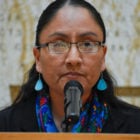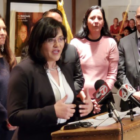Food Stamps
Federal rules could cut food aid for up to 37,000 New Mexicans
|
Up to 37,000 New Mexicans will lose food aid under stricter mandates approved Wednesday by the Trump administration, the governor’s office reported. Nearly 700,000 people will be affected across the U.S.
Currently, New Mexico waives work requirements statewide for able-bodied adults without children, but under the finalized rule change it will have less flexibility to do so going forward. Without that waiver, adults ages 18 to 49 can not receive SNAP benefits for more than three months in a three year period unless they work at least 20 hours a week or participate in a job training program. The number of recipients varies by month, but the state Human Services Department said 37,164 were eligible in October 2019. The change is likely to trim $5.5 billion from the federal food stamp program across the country over five years.







